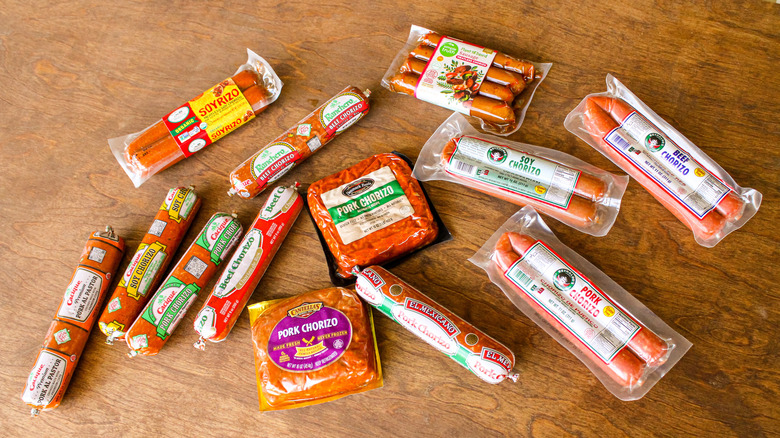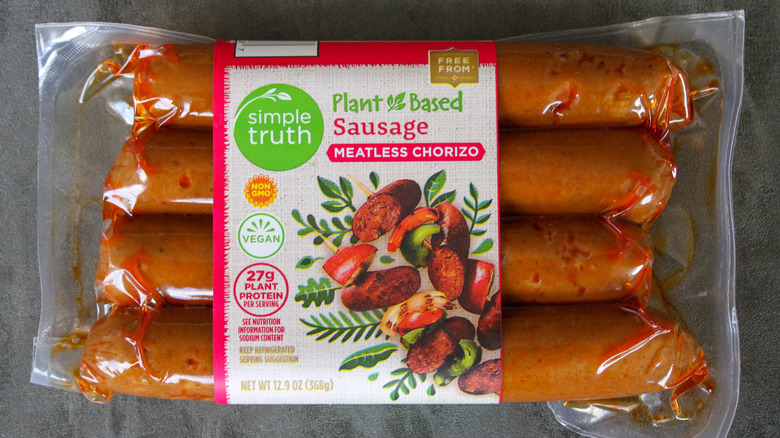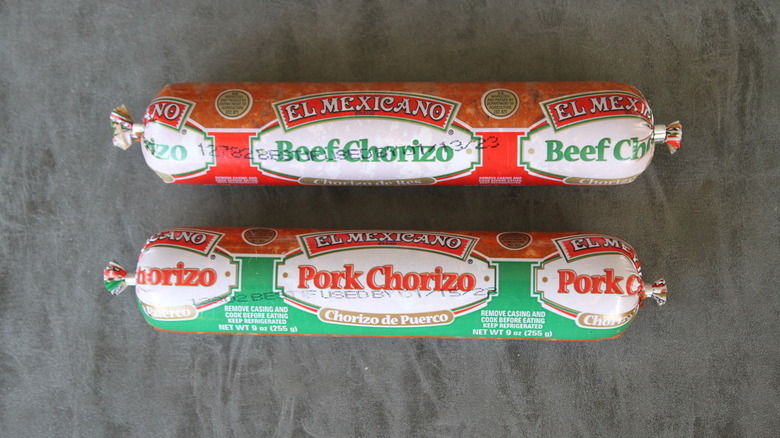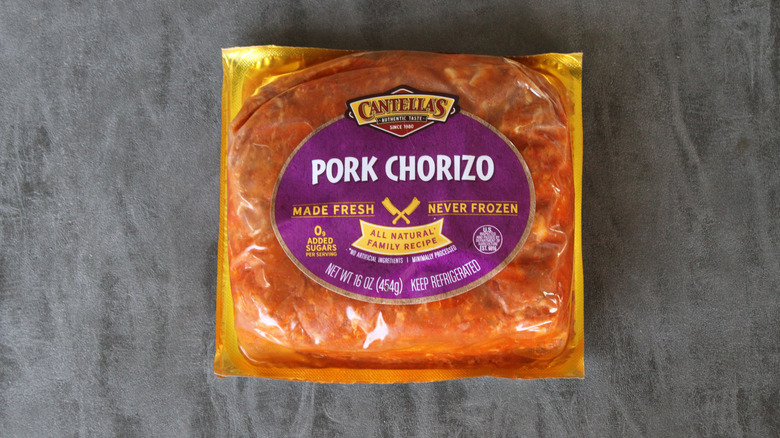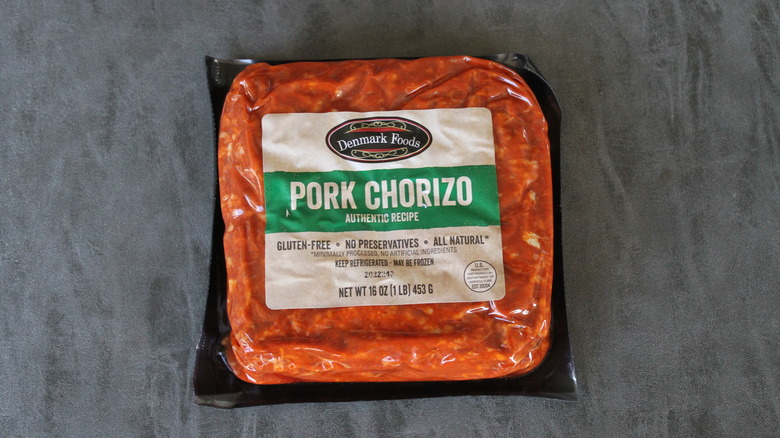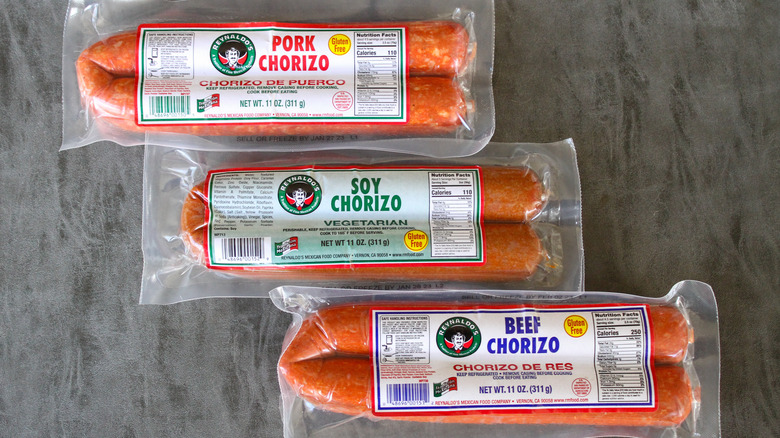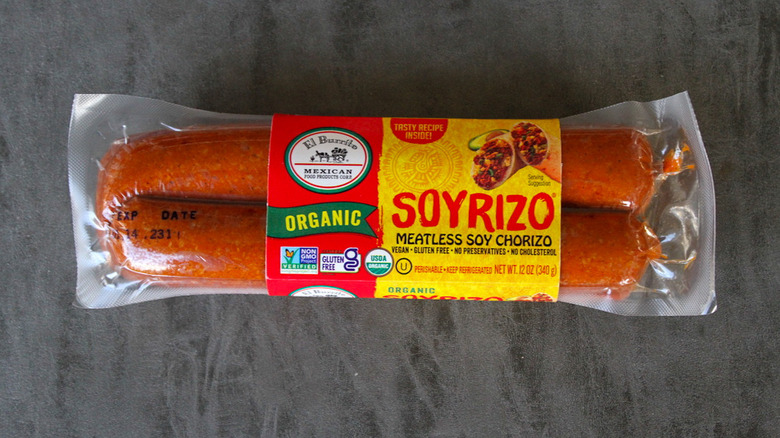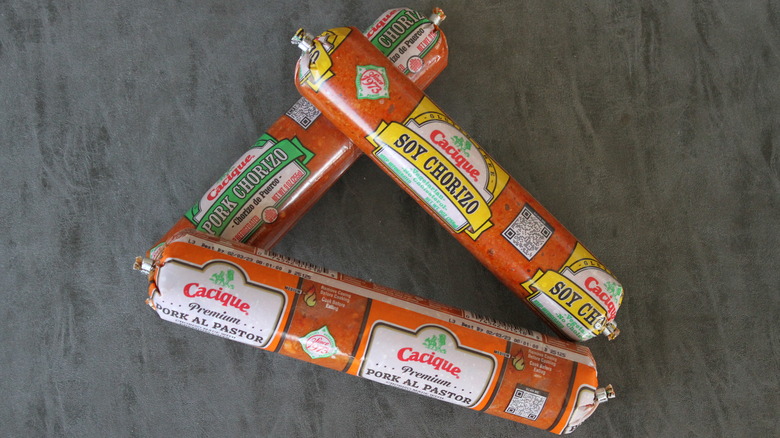7 Chorizo Brands, Ranked Worst To Best
Chorizo is a heavily flavored pork sausage (except when it's not). In America, "chorizo" likely refers to a raw, spicy, Mexican fresh sausage that gets its red color from chile peppers. In Europe, it typically means a cured, hard, smokey sausage that may be either cured or uncured — the red color, in this instance, is from Spanish paprika (aka pimentón). In addition to traditional pork chorizo, today's markets include beef, chicken, lamb, and veal chorizos and several increasingly popular vegan chorizo products that can work in many chorizo recipes.
Mexican chorizo is a fresh and uncured version of Spanish chorizo. Fresh sausage meat is combined with pork fat, vinegar, chiles, and other spices. It's stuffed in casings, then air-dried for up to a week. Mexican chorizo is a remarkably versatile ingredient. The taste profile features the tang of vinegar with the spice of chiles and the richness of the pork.
While Spanish and Mexican chorizos are generally not interchangeable, some dishes work with either: chorizo with clams, for example. Vegan and beef chorizos can be used wherever the pork version would ordinarily be found, and there is no shortage of ways to use chorizo. From chorizo and eggs to corn soup or breakfast tacos, chorizo is an incredibly versatile ingredient within (and even outside) Mexican cuisine.
With so many products out there, which are the best brands and which are, well, not? Let's explore chorizo products, from not-so-great to fantastic.
7. Simple Truth Meatless Chorizo
The simple truth about the plant-based "Meatless Chorizo" product from Simple Truth — Kroger's plant-based food product line — is that it is not chorizo. It's not Mexican chorizo any more than Spanish chorizo (and it's definitely not that). The reason it's not chorizo isn't due to its lack of pork (or beef, chicken, lamb, or veal). It has absolutely nothing to do with the fact it is a vegan product.
Simple Truth's product doesn't look like chorizo. It does not eat like chorizo or cook like meat-based chorizo. Most importantly, the sausage doesn't even taste like chorizo. Instead, Simple Truth's wheat-based, meatless "chorizo" is more like a vaguely-cloaked chorizo-inspired hot dog that fondly remembers having once been to a Cinco de Mayo party where it had fun and developed a slight fondness for sombreros. This take on meatless chorizo is, at best, Mexican-ish. If one really wants to press the envelope, it's possible to see it as a good product. It's just not a good rendition of chorizo.
6. El Mexicano Chorizo
El Mexicano's pork, beef, and soy chorizo (sometimes called "soyrizo") offer good acidity and saltiness up front with a layer of chile flavors behind. The fundamental problem with El Mexicano's chorizos is that the products lack texture. They literally fall apart almost as soon as they hit the pan, leaving a massive pool of fat where — mere moments ago — there had been chorizo. If the oil slick produced by this chorizo were petroleum on the ocean surface, seagulls would be imperiled. Don't get us wrong: rendered chorizo fat can and should be a feature of good chorizo, not a flaw. However, when the rendered fat to residual meat ratio ventures into the stratosphere, there's a problem.
Of course, one person's problem can be another's boon: strain and harvest that chorizo fat. Use it, for example, to make chorizo fried eggs the next morning, or fry up a batch of hash browns. Frankly, anything that you can make with oil is a candidate to be made better with chorizo fat. Get creative! It might even make an excellent mayonnaise.
5. Cantella's Chorizo
Cantella's boasts that their chorizo is "[m]ade from fresh pork shoulder (no by-products are ever added)," and it shows. It was one of the two meatiest chorizos tested and offered a solid texture and good chile flavors. What the product lacks, though, is fat. It has, in essence, exactly the opposite problem of El Mexicano's chorizo. While the fat content of the latter was too high, Cantella's did not offer enough. "Low fat" may be marketing gold in some circles, but chorizo generally does not travel in that vicinity. Indeed, arguably, it should not.
As a result, Cantella's is not a good option for many dishes one might want to make with chorizo: chorizo tacos — breakfast tacos, for example — or enchiladas, or other dishes that focus on the richness of the sausage meat. You could also take your next pasta meal to a different continent and use chorizo in your next Bolognese. The flip side is that Cantella's is a good choice for dishes emphasizing chorizo's meatiness and chile flavors. Clams with chorizo is one good bet, and huevos con chorizo or chorizo hamburgers might be other fine options.
4. Denmark Foods Chorizo
The leading characteristic of Denmark Foods Pork Chorizo is its wonderful meaty textures and flavors. Much like that of Cantella's chorizo, that savory meatiness is accompanied by relatively low levels of fat. Unlike the Cantella's, however, the Denmark Foods chorizo brings the acidity of vinegar to the party along with robust and well-balanced chile flavors. The relative lack of rendered fat produced by this chorizo makes it a less-than-ideal option for some dishes, but its balance opens up a world of possibilities.
For example, the bright flavors of Denmark Foods' chorizo product make it a particularly good pairing with queso fundido, the classic Mexican answer to Switzerland's fondue and one of those dishes that is every bit as much fun to eat as it is delicious. Or, go a different direction and use the chorizo in a shakshuka, the classic Israeli Egg Dish. The cross-cultural mashup of Mexican and Israeli will look sophisticated on you.
3. Reynaldo's Chorizo
Reynaldo's makes pork, beef, and soy chorizo products that differ greatly from each other. Indeed, the variance between this brand's chorizo products is more significant than any of the other brands we tested. The signature pork product was classic in style with a somewhat loose texture and flavor profile that is well balanced between acid, chile, salty, sweet, and savory. The texture of the beef chorizo was more solid than that of the pork but with an emphasis on the vinegary notes. While the chile flavors were there, when you looked for them, they were slightly muted.
Reynaldo's soy chorizo was another story altogether. The color of the soy chorizo leaned heavily toward brown. Indeed, if we were told this was a vegan sausage other than chorizo, we would have absolutely no trouble believing that to be true. It might not be an exaggeration to suggest that it was Reynaldo's that put the word "soy" — as in soy sauce (perhaps half a bottle) — in soy chorizo.
2. El Burrito
El Burrito Food Products sells three soy chorizo products: Organic Soyrizo, Non-GMO Soyrizo, and a "Soy Good" Organic Soy Chorizo. They demonstrate that chorizo does not need to be made from animal flesh to be good. And El Burrito's soyrizo products are just that: good. Very good, in fact. And they do so without a hint of meat.
Rather, El Burrito's soyrizo products are based on textured soy proteins. The result is a rich, robust layer of savory flavor (including no shortage of salt) balanced by the brightness of vinegar and a hint of sweetness from dextrose. While this vegan chorizo is not particularly spicy, ancho chile provides just enough spiciness to round out the flavor profile. El Burrito's soy chorizo products are hardly fat bombs, yet they contain enough for the chorizo to be used whenever you want a vegan substitute for classic pork chorizo.
1. Cacique
Cacique was not only our top chorizo brand but also that of celebrity chef Aaron Sanchez. And it is happily one of the most readily available and prominent chorizo brands — for that matter, Mexican food brands as a whole — in the United States today. Indeed, the company offers seven different chorizo products, five under the "Cacique" flag and two under the "Ranchero" mark. Perhaps one of the reasons the products are so prominent in the marketplace is at least in part because they are good. The Ranchero beef chorizo could well have been the best chorizo overall in our tasting. It was meaty but also had good fat. The acidity was prominent but not overwhelming, and the texture was both versatile and pleasant.
The Cacique Premium Pork al Pastor was nearly as good, featuring deep, savory flavors but with some of chorizo's acidic flavors replaced by classic al pastor achiote and sweet ones. The straight pork chorizo was a bit loose in texture, though it has an excellent flavor balance. Even the least impressive of the brand's chorizo line, the soy product, was still delicious.
